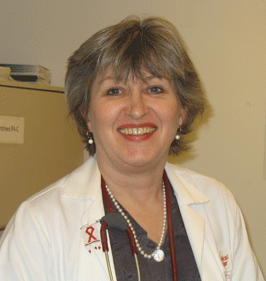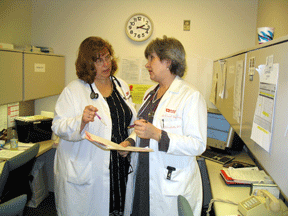 |
Susan Swindells |
On Jan. 1, Dr. Swindells began a two-year term as vice-chair. She will assume the position as chair for two more years beginning on Jan. 1, 2006.
“This is a huge honor,” Dr. Swindells said. “Being elected to a leadership position in this organization is really the pinnacle of my research career to date. My election is also a very important development for Nebraska to be represented in the AACTG at this level because our state is a very small player in the AIDS world from every other aspect.”
Dr. Swindells’ HIV research team conducts many AATCG studies. She is involved with every one, either as primary investigator or other role.
“I help the protocol team with the study design and coordinating the protocol, mentoring junior research staff members, helping researchers less familiar with the HIV research system to navigate the system and continually working with the pharmaceutical industry to assist our efforts,” Dr. Swindells said.
 |
Dr. Susan Swindells, right, reviews a patient’s file with Ann Fitzgerald, HIV Clinic nurse practitioner. |
Many changes have occurred in the treatment and management of complications related to HIV disease and its therapy over the past several years. Because of the extensive use of highly active antiretroviral therapy (HAART), the incidence of opportunistic infections has decreased dramatically, and a spectrum of new neurological, renal, cardiovascular, hepatic and metabolic complications has emerged.
“One of the major goals I have for the AACTG is to develop and implement trials in resource-poor settings – for example, Africa,” Dr. Swindells said. “The world has finally noticed that sub-Saharan Africa is being devastated by AIDS and money is now available for research and treatment. We have a lot to learn about how best to do it, though. One of my big jobs in the next two years is to work on treating tuberculosis in people with HIV infection at the international sites.”
Dr. Swindells’ committee is one of only three major divisions of the AACTG. The HIV Disease Research Agenda Committee aims to development new treatment strategies to limit the replication of HIV-1, develop and validate laboratory techniques, and improve and optimize study design. The Immunology Research Agenda Committee focuses on the design of clinical trials for reconstituting HIV specific immunity and general immunomodulation. The three divisions work closely together to develop better treatments for HIV.
Without research, there is no hope of eradicating HIV disease and the AACTG is the major player in this field, Dr. Swindells said.
“All that we know about treatment of HIV and its complications come from research,” Dr. Swindells said. “Research leads to the development of new drugs. Research also guides the prevention/education efforts against the disease. Research is the key to the whole problem.”